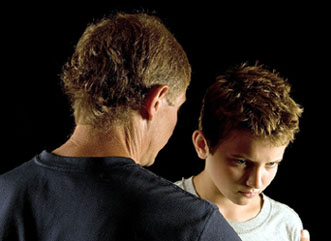A few years back, a research study on parental discipline emerged from the Australian Institute of Family Studies, and here’s the big headline for fathers:
Dads are largely shirking discipline duties.
“When it comes to disciplining the kids, there’s been a role reversal in the modern home,” the study concluded, with moms being more consistent in discipline than dads. The researchers found that dads are no longer the strict disciplinarians that they were in the ’50s and ’60s, and are more likely to let children get away with wrong behavior and less likely to talk through discipline issues with the kids.
In many ways, this is not surprising. Generally speaking, fathers today may be less involved than moms, and many of us could do a lot more to share parenting duties. But we are making progress; we’re generally more involved in our children’s lives compared with dads a generation ago, who were usually expected to be breadwinners and disciplinarians only, and moms sometimes handled discipline issues with the threat, “Wait until your dad gets home.”

This study may not offer striking new insights, but it does provide a valuable opportunity to examine our habits and practices with our children. Here’s more on the study.
When the kids misbehave, why do some dads leave the situation for Mom to handle?
Maybe Mom spends much more time with the kids and Dad feels less connected to what’s happening. Maybe a man’s own father didn’t discipline, so he’s hesitant. Or his father corrected him in negative or even abusive ways, so he doesn’t know what healthy discipline looks like. Maybe he simply has misplaced priorities and would rather not stop what he’s doing at the time to deal with a challenging situation.
But discipline cannot be done by remote control, and dads need to sign up for the entire role of being a father. That includes a lot of play and fun times, but also being highly involved in disciplining and correcting their children. Here are four reasons to not shirk this role:
- Moms can get overloaded trying to be the only authority figure. It’s up to us to set an example of what a good father looks like.
- By being passive, we’re training our children to be irresponsible and disrespectful. We may think we’re communicating love by not upsetting them, but our actions really say that we don’t care enough to expect right behavior.
- We’re sending the message that certain values are situational— they can change depending on who is in charge. Our children could go through life looking for the easy way out rather than dealing with things in a healthy, straightforward way.
- Moms and dads need to be on the same page, so kids get consistent signals and reliable reference points to navigate their way through the world.
Fathers father.
Committed fathers don’t pick and choose what roles to fulfill. Once they know what they need to do, they do it. They sign on for the whole range of fathering tasks, because they know their kids need them to be involved in all those areas — even the difficult ones.
ACTION POINTS
- Have a private conversation with your kids’ mother and create a discipline plan together, with clear boundaries and expectations for your children. That way, you won’t be caught by surprise, where you have to negotiate with your child or try to think of consequences on the spot. Dads and moms do tend to handle issues somewhat differently, and that can be good, but we do need to be united in our approach.
- Also, talk to her about your role as a father. Are you doing your part in handling discipline situations? Make a commitment to be highly involved.
- In addition to correcting your child’s bad choices, give him reasons to make good choices. Talk about the principles behind your rules, and be sure to give lots of positive reinforcement for good behavior.
- Find a way to turn an everyday task into a crazy or fun time with your child.
- Go to our website to read about how disciplining your child can be like giving a speeding ticket or to receive more insights on discipline.
- Take delight in your children. Be thrilled the minute your son or daughter walks in the room.
Recommended Resources:
– Parenting with Love and Logic by Foster Cline MD & Jim Fay
– Parenting Teens with Love and Logic by Foster Cline MD & Jim Fay

